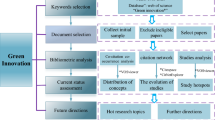Abstract
Green Chemistry (GC) is an answer to the problems ensuing from chemical pollution, adopting a proactive, prevention-based stance. After nearly three decades of its coming into being, the advances in the field towards groundbreaking chemical practice are still under discussion and new research is needed in order to systematize existing knowledge and to point to efficient means to select information. Our purpose with this study is to broaden the understanding on GC research structure, by pointing the researchers that have most contributed to its growth, spread and consolidation (its intellectual hubs), and the authors upon whose knowledge they have drawn (intellectual authorities). We analyzed 14,142 documents either containing the term “green chemistry” or published in Green Chemistry and Green Chemistry Letters and Reviews between 1990 and 2017, using network analysis and co-citation analysis. Fourteen hubs were found, and twenty-one intellectual authorities, distributed along six big specialties, previously described in the literature. Results corroborate previous analyses of the field, but this research has the advantage of stemming from the dynamics of scientific production, rather than from previously defined qualitative categories of the field itself.
Access this chapter
Tax calculation will be finalised at checkout
Purchases are for personal use only
Similar content being viewed by others
References
ACS: History of Green Chemistry. https://www.acs.org/content/acs/en/greenchemistry/what-is-green-chemistry/history-of-green-chemistry.html. Accessed 28 Sep 2019
Anastas, P.T., Han, B., Leitner, W., Poliakoff, M.: “Happy silver anniversary”: green chemistry at 25. Green Chem. 18(1), 12–13 (2016). https://doi.org/10.1039/c5gc90067k
Poliakoff, M.: Green chemistry: science and politics of change. Science 297(5582), 807–810 (2002). https://doi.org/10.1126/science.297.5582.807
US EPA, O.: Pollution Prevention Law and Policies. https://www.epa.gov/p2/pollution-prevention-law-and-policies. Accessed 28 May 2018
Anastas, P.T., Warner, J.C.: Green Chemistry: Theory and Practice. Oxford University Press, Oxford (1998)
Marcelino, L.V., Pinto, A.L., Marques, C.A.: Scientific specialties in green chemistry. Scientometrics (submitted)
Marcelino, L.V., Marques, C.A.: Trends in green chemistry research. In: Reunião Anual da Sociedade Brasileira de Química: programa e resumos, p. 875. SBQ, Joinville (2019)
Anastas, P.T., et al.: The Green ChemisTREE: 20 years after taking root with the 12 principles. Green Chem. 20(9), 1929–1961 (2018). https://doi.org/10.1039/c8gc00482j
Clark, J.H., Sheldon, R.A., Raston, C., Poliakoff, M., Leitner, W.: 15 years of green chemistry. Green Chem. 16(1), 18–23 (2014). https://doi.org/10.1039/c3gc90047a
Ivanković, A.: Review of 12 principles of green chemistry in practice. Int. J. Sustain. Green Energy 6(3), 39 (2017). https://doi.org/10.11648/j.ijrse.20170603.12
Chen, C.: CiteSpace II: detecting and visualizing emerging trends and transient patterns in scientific literature. J. Am. Soc. Inf. Sci. Technol. 57(3), 359–377 (2006). https://doi.org/10.1002/asi.20317
Chen, C.: Science mapping: a systematic review of the literature. J. Data Inf. Sci. 2(2), 1–40 (2017). https://doi.org/10.1515/jdis-2017-0006
Kleinberg, J.M.: Hubs, authorities, and communities. ACM Comput. Surv. 31(4), 1–5 (1999). https://doi.org/10.1145/345966.345982
RSC: “Happy silver anniversary”: Green Chemistry at 25. Themed Collection. https://pubs.rsc.org/en/journals/articlecollectionlanding?sercode=gc&themeid=17fdd7fc-ff5b-46ca-ba3e-5702b2eb223. Accessed 24 Sep 2018
Noyons, E.C.M.: Bibliometric mapping as a science policy and research management tool (1999). https://openaccess.leidenuniv.nl/handle/1887/38308
Price, D.J.D.S.: Networks of scientific papers. Science 149(3683), 510–515 (1965). https://doi.org/10.1126/science.149.3683.510
Anastas, P.T., Eghbali, N.: Green chemistry: principles and practice. Chem. Soc. Rev. 39(1), 301–312 (2010). https://doi.org/10.1039/b918763b
Sheldon, R.A.: Green chemistry and resource efficiency: towards a green economy. Green Chem. 18(11), 3180–3183 (2016). https://doi.org/10.1039/c6gc90040b
Delidovich, I., Palkovits, R.: Catalytic versus stoichiometric reagents as a key concept for green chemistry. Green Chem. 18(3), 590–593 (2016). https://doi.org/10.1039/c5gc90070k
Li, C.J.: Reflection and perspective on green chemistry development for chemical synthesis—Daoist insights. Green Chem. 18(7), 1836–1838 (2016). https://doi.org/10.1039/c6gc90029a
Llevot, A., Meier, M.A.R.: Renewability – a principle of utmost importance! Green Chem. 18(18), 4800–4803 (2016). https://doi.org/10.1039/c6gc90087a
Quadrelli, E.A.: 25 years of energy and green chemistry: saving, storing, distributing and using energy responsibly. Green Chem. 18(2), 328–330 (2016). https://doi.org/10.1039/c5gc90069g
Peters, M., von der Assen, N.: It is better to prevent waste than to treat or clean up waste after it is formed – or: what Benjamin Franklin has to do with “Green Chemistry”. Green Chem. 18(5), 1172–1174 (2016). https://doi.org/10.1039/c6gc90023b
Wakaki, T., Oisaki, K., Kanai, M.: Elementary and systemic views of the generation of toxic substances. Green Chem. 18(13), 3681–3683 (2016). https://doi.org/10.1039/c6gc90058e
Sneddon, H.: Safety first. Green Chem. 18(19), 5082–5085 (2016). https://doi.org/10.1039/c6gc90086k
Jessop, P.G.: The use of auxiliary substances (e.g. solvents, separation agents) should be made unnecessary wherever possible and innocuous when used. Green Chem. 18(9), 2577–2578 (2016). https://doi.org/10.1039/c6gc90039a
Author information
Authors and Affiliations
Corresponding author
Editor information
Editors and Affiliations
Rights and permissions
Copyright information
© 2020 ICST Institute for Computer Sciences, Social Informatics and Telecommunications Engineering
About this paper
Cite this paper
Marcelino, L.V., Pinto, A.L., Marques, C.A. (2020). Intellectual Authorities and Hubs of Green Chemistry. In: Mugnaini, R. (eds) Data and Information in Online Environments. DIONE 2020. Lecture Notes of the Institute for Computer Sciences, Social Informatics and Telecommunications Engineering, vol 319. Springer, Cham. https://doi.org/10.1007/978-3-030-50072-6_15
Download citation
DOI: https://doi.org/10.1007/978-3-030-50072-6_15
Published:
Publisher Name: Springer, Cham
Print ISBN: 978-3-030-50071-9
Online ISBN: 978-3-030-50072-6
eBook Packages: Computer ScienceComputer Science (R0)




